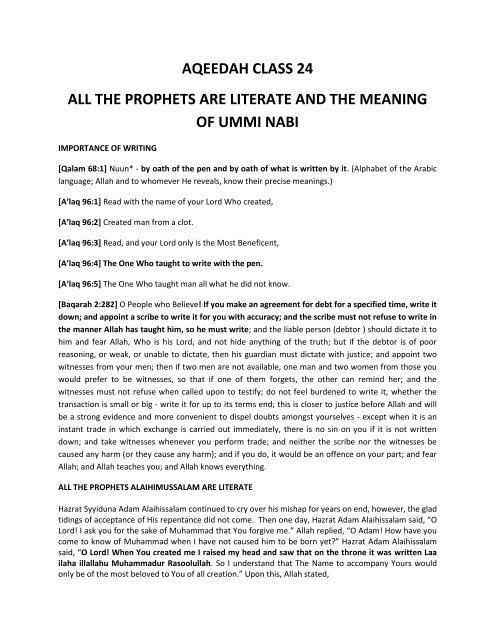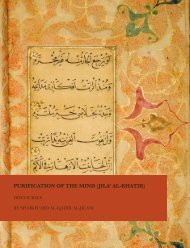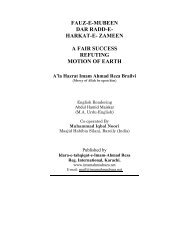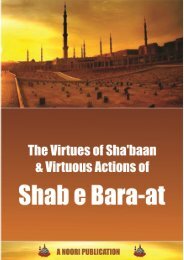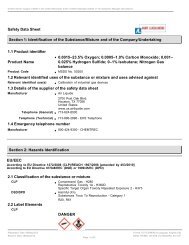Aqeedah Class 24 (Ummi Nabi) (1)
ALL THE PROPHETS ARE LITERATE AND THE MEANING OF UMMI NABI
ALL THE PROPHETS ARE LITERATE AND THE MEANING OF UMMI NABI
Create successful ePaper yourself
Turn your PDF publications into a flip-book with our unique Google optimized e-Paper software.
AQEEDAH CLASS <strong>24</strong><br />
ALL THE PROPHETS ARE LITERATE AND THE MEANING<br />
OF UMMI NABI<br />
IMPORTANCE OF WRITING<br />
[Qalam 68:1] Nuun* - by oath of the pen and by oath of what is written by it. (Alphabet of the Arabic<br />
language; Allah and to whomever He reveals, know their precise meanings.)<br />
[A’laq 96:1] Read with the name of your Lord Who created,<br />
[A’laq 96:2] Created man from a clot.<br />
[A’laq 96:3] Read, and your Lord only is the Most Beneficent,<br />
[A’laq 96:4] The One Who taught to write with the pen.<br />
[A’laq 96:5] The One Who taught man all what he did not know.<br />
[Baqarah 2:282] O People who Believe! If you make an agreement for debt for a specified time, write it<br />
down; and appoint a scribe to write it for you with accuracy; and the scribe must not refuse to write in<br />
the manner Allah has taught him, so he must write; and the liable person (debtor ) should dictate it to<br />
him and fear Allah, Who is his Lord, and not hide anything of the truth; but if the debtor is of poor<br />
reasoning, or weak, or unable to dictate, then his guardian must dictate with justice; and appoint two<br />
witnesses from your men; then if two men are not available, one man and two women from those you<br />
would prefer to be witnesses, so that if one of them forgets, the other can remind her; and the<br />
witnesses must not refuse when called upon to testify; do not feel burdened to write it, whether the<br />
transaction is small or big - write it for up to its terms end; this is closer to justice before Allah and will<br />
be a strong evidence and more convenient to dispel doubts amongst yourselves - except when it is an<br />
instant trade in which exchange is carried out immediately, there is no sin on you if it is not written<br />
down; and take witnesses whenever you perform trade; and neither the scribe nor the witnesses be<br />
caused any harm (or they cause any harm); and if you do, it would be an offence on your part; and fear<br />
Allah; and Allah teaches you; and Allah knows everything.<br />
ALL THE PROPHETS ALAIHIMUSSALAM ARE LITERATE<br />
Hazrat Syyiduna Adam Alaihissalam continued to cry over his mishap for years on end, however, the glad<br />
tidings of acceptance of His repentance did not come. Then one day, Hazrat Adam Alaihissalam said, “O<br />
Lord! I ask you for the sake of Muhammad that You forgive me.” Allah replied, “O Adam! How have you<br />
come to know of Muhammad when I have not caused him to be born yet?” Hazrat Adam Alaihissalam<br />
said, “O Lord! When You created me I raised my head and saw that on the throne it was written Laa<br />
ilaha illallahu Muhammadur Rasoolullah. So I understand that The Name to accompany Yours would<br />
only be of the most beloved to You of all creation.” Upon this, Allah stated,
“you have spoken the truth, O Adam. He is the most beloved of all creation to Me. And since you ask Me<br />
for his sake, then I have forgiven you. And if Muhammad was not, then I would not have created you.”<br />
(Al Haakim in his Mustadrak, Baihaqi in Dalail an Nubuwwah, Tabarani in his Kabeer, Abu<br />
Na’eem in his Hilya, Imam Subuki in Shifa us Siqam and ibn Asakir in Tarikh Damishq, Ibn<br />
Thaimiya in Qaaidah al Jaleelah)<br />
Concerning Hazrat Musa Alaihissalam, Allah Tha’ala states in The Holy Quran:<br />
[Aa`raf 7:145] And We wrote for him on the tablets, the advice for all things and the details of all<br />
things; and commanded "Accept it firmly and command your people to choose its good advices; soon I<br />
shall show you people the destination of the disobedient."<br />
Concerning Hazrat Isa Alaihissalam, Allah Tha’ala states,<br />
[Maryam 19:30] The child proclaimed, "I am Allah’s bondman; He has given me the Book and made me<br />
a Herald of the Hidden (a Prophet)."<br />
[Maryam 19:31] "And He has made me blessed wherever I be; and ordained upon me prayer and<br />
charity, as long as I live."<br />
Concerning Hazrat Sulaiman Alaihissalam, Allah Tha’ala states,<br />
[Naml 27:27] Said Sulaiman, “We shall now see whether you spoke the truth or are among the liars.”<br />
[Naml 27:28] “Go with this letter of mine and drop it upon them - then move aside from them and see<br />
what they answer in return.”<br />
[Naml 27:29] The woman said, “O chieftains, indeed a noble letter has been dropped upon me.”<br />
[Naml 27:30] “Indeed it is from Sulaiman, and it is (begins) with ‘Allah - in the name of - the Most<br />
Gracious, the Most Merciful.’ ”<br />
[Naml 27:31] “That ‘Do not wish eminence above me, and present yourselves humbly to me, with<br />
submission.’ ”<br />
If Hazrat Adam Alaihissalam could read the declaration of faith written on the throne, Hazrat Musa<br />
Alaihissalam could read the Torah written on the Tablets and Hazrat Isa Alaihissalam spoke divine<br />
revelation in his mother’s lap, and the other Prophets reading and writing as mentioned in Hadees and<br />
in Thafseer does it make sense that our Beloved Prophet, Who is The Leader and Imam of all the<br />
Prophets Alaihimussalam, could not read the divine revelation even at the age of forty years? Moreover,<br />
previous Prophets were taught by Allah to read before the annunciation of Prophet hood? This scenario<br />
does not suit the grandeur and is not befitting to the status of The Noble Prophet Sallallahu Alaihi<br />
Wasallam.
ALLAH IS THE TEACHER FOR HIS HABEEB SALLALLAHU ALAIHI WASALLAM<br />
[Shua`ra 26:192, 193, 194] And indeed this Qur’an has been sent down by the Lord Of The Creation. The<br />
Trustworthy Spirit brought it down. (Angel Jibreel – peace be upon him.) Upon your heart, for you to<br />
convey warning.<br />
[Baqarah 2:97] Say (O dear Prophet Mohammed - peace and blessings be upon him), "Whoever is an<br />
enemy to Jibreel (Gabriel)" - for it is he who has brought down this Qur'an to your heart by Allah’s<br />
command, confirming the Books before it, and a guidance and glad tidings to Muslims.<br />
[Rahman 55:1, 2, 3, 4] Allah, the Most Gracious Has taught the Qur’an to His beloved Prophet<br />
(Mohammed - peace and blessings be upon him). Has created Prophet Mohammed (peace and blessings<br />
be upon him) as the soul of mankind. Has taught him the knowledge of the past and the future.<br />
[Nisa 4:113] And O dear Prophet, were it not for Allah’s munificence and His mercy upon you, a group<br />
among them would have wished to deceive you; and they only mislead themselves and will not harm<br />
you at all; and Allah has sent down upon you the Book and wisdom, and taught you all what you did<br />
not know*; and upon you is Allah’s great munificence. (Allah gave the knowledge of the hidden to the<br />
Holy Prophet peace and blessings be upon him.)<br />
[Ibrahim 14:4] And We sent every Noble Messenger with the same language as his people *, so that he<br />
may clearly explain to them; then Allah sends astray whomever He wills, and He guides whomever He<br />
wills; and He only is the Most Honourable, the Wise. (* Prophet Mohammed - peace and blessings be<br />
upon him - was taught all the languages as he is sent towards all.)<br />
[Bayyinah 98:1,2,3] The disbelieving People of the Book(s) and the polytheists would not have left their<br />
religion until the clear proof came to them. (The clear proof is) the Noble Messenger from Allah, who<br />
reads the pure pages. In which are written proper affairs.<br />
[Aa`raf 7:157] "Those who will obey this Noble Messenger (Prophet Mohammed - peace and blessings<br />
be upon him), the Herald of the Hidden who is untutored * (except by Allah), whom they will find<br />
mentioned in the Taurat and the Injeel with them; he will command them to do good and forbid them<br />
from wrong, and he will make lawful for them the good clean things and prohibit the foul for them, and<br />
he will unburden the loads and the neck chains which were upon them; so those who believe in him,<br />
and revere** him, and help him, and follow the light which came down with him - it is they who have<br />
succeeded." (*The Holy Prophet was taught by Allah Himself - see Surah 55 Al-Rahman. **To honour the<br />
Holy Prophet peace and blessings be upon him is part of faith. To disrespect him is blasphemy.)<br />
[Aa`raf 7:158] Say (O dear Prophet Mohammed - peace and blessings be upon him), "O people! Indeed I<br />
am, towards you all, the Noble Messenger of Allah - for Whom (Allah) only is the kingship of the heavens<br />
and the earth; there is none worthy of worship, except Him - giving life and giving death; therefore<br />
believe in Allah and His Noble Messenger, the Prophet who is untutored (except by Allah), who<br />
believes in Allah and His Words, and obey him (the Prophet) to attain guidance." (Prophet Mohammed<br />
peace and blessings be upon him is the Prophet towards all mankind.)
OUR NABI SALLALLAHU ALAIHI WASALLAM IS THE TEACHER AND THE PURIFIER<br />
[A/I`mran 3:164] Allah has indeed bestowed a great favour upon the Muslims, in that He sent to them a<br />
Noble Messenger (Prophet Mohammed - peace and blessings be upon him) from among them, who<br />
recites to them His verses, and purifies them, and teaches them the Book and wisdom; and before it,<br />
they were definitely in open error. (The Holy Prophet Mohammed peace and blessings be upon him is<br />
one of Allah’s greatest favours to mankind.)<br />
[Baqarah 2:129] "Our Lord! And send towards them a Noble Messenger, from amongst them, to recite<br />
to them Your verses, and to instruct them in Your Book and sound wisdom*, and to fully purify them;<br />
indeed You only are the Almighty, the Wise." (The traditions of the Holy Prophet “ sunnah and hadith<br />
are called wisdom.)<br />
[Baqarah 2:151] The way We have sent to you a Noble Messenger from among you, who recites to you<br />
Our verses and purifies you, and teaches you the Book and sound wisdom*, and teaches you what you<br />
did not know. (The traditions / sayings of the Holy Prophet - peace and blessings be upon him).<br />
[Juma`h 62:1, 2] All whatever is in the heavens and all whatever is in the earth proclaims the Purity of<br />
Allah, the King, the Most Pure, the Most Honourable, the Wise. It is He Who has sent among the<br />
unlettered people a Noble Messenger from themselves, who recites His verses to them and purifies<br />
them, and bestows them the knowledge of the Book and wisdom; and indeed before this, they were in<br />
open error.<br />
OUR NABI SALLALLAHU ALAIHI WASALLAM KNEW TO READ AND WRITE<br />
[Bayyinah 98:1,2,3] The disbelieving People of the Book(s) and the polytheists would not have left their<br />
religion until the clear proof came to them. (The clear proof is) the Noble Messenger from Allah, who<br />
reads the pure pages. In which are written proper affairs.<br />
[Furqan 25:3,4,5,6] And people have appointed other Gods besides Him, those who do not create<br />
anything but are themselves created, and those who do not have the power to harm or benefit<br />
themselves, and who do not have any authority over death or life nor over resurrection. And the<br />
disbelievers said, “This is nothing but a slur he has fabricated and others have helped him upon it”; so<br />
indeed the disbelievers have stooped to injustice and lie. And they said, “These are stories of the<br />
former people, which he has written down, so they are read to him morning and evening.” Proclaim (O<br />
dear Prophet Mohammed - peace and blessings be upon him), “It is sent down by Him Who knows all<br />
the secrets of the heavens and the earth; indeed He Oft Forgiving, Most Merciful."<br />
Narrated Al-Bara: When the Prophet intended to perform 'Umra in the month of Dhul-Qada, the people<br />
of Mecca did not let him enter Mecca till he settled the matter with them by promising to stay in it for<br />
three days only. When the document of treaty was written, the following was mentioned: 'These are the<br />
terms on which Muhammad, Allah's Apostle agreed (to make peace).' They said, "We will not agree to<br />
this, for if we believed that you are Allah's Apostle we would not prevent you, but you are Muhammad<br />
bin 'Abdullah." The Prophet said, "I am Allah's Apostle and also Muhammad bin 'Abdullah." Then he said
to 'Ali, "Rub off (the words) 'Allah's Apostle' ", but 'Ali said, "No, by Allah, I will never rub off your name."<br />
So, Allah's Apostle took the document and wrote, 'This is what Muhammad bin 'Abdullah has agreed<br />
upon: (Bukhari Book 49, Hadees 863)<br />
Narrated Al-Bara: When the Prophet intended to perform the 'Umra he sent a person to the people of<br />
Mecca asking their permission to enter Mecca. They stipulated that he would not stay for more than<br />
three days and would not enter it except with sheathed arms and would not preach (Islam) to any of<br />
them. So Ali bin Abi-Talib started writing the treaty between them. He wrote, "This is what Muhammad,<br />
Apostle of Allah has agreed to." The (Meccans) said, "If we knew that you (Muhammad) are the Apostle<br />
of Allah, then we would not have prevented you and would have followed you. But write, 'This is what<br />
Muhammad bin 'Abdullah has agreed to..' " On that Allah's Apostle said, "By Allah, I am Muhammad bin<br />
'Abdullah, and, by Allah, I am Apostle of 'Allah." Allah's Apostle used not to write; so he asked 'Ali to<br />
erase the expression of Apostle of Allah. On that 'Ali said, "By Allah I will never erase it." Allah's Apostle<br />
said (to 'Ali), "Let me see the paper." When 'Ali showed him the paper, the Prophet erased the<br />
expression with his own hand. (Bukhari Book 53, Hadees 408)<br />
Sayyiduna Abdullah bin Amr bin al-Aas (radi Allahu anhu) reports: The Holy Prophet (sallal laahu alaihi<br />
wasallam) came out of his house bearing two books in his hands. He said, "Do you know what are these<br />
books?" We said, "No, O Allah's Messenger. Please tell us about these books." The Holy Prophet (sallal<br />
laahu alaihi wasallam) pointed at the book in his right hand and said, "This is the Book from Almighty<br />
Allah. It contains the names of the inmates of Paradise and their father's names and the names of their<br />
clans. The total number of the inmates of Paradise is given at the end of this book." Then the Holy<br />
Prophet (sallal laahu alaihi wasallam) pointed at the other book in his left hand and said, "This is a<br />
Book from Allah, the Creator of the worlds. It contains the names of the inmates of Hell and their<br />
father's names and the names of their tribes. The total number of inmates of the Hell is given at the end<br />
of the text. This number will never change, neither addition nor deletion." The companions said, "O<br />
Master! If everything is predestined then what is the necessity of actions." The Apostle of Allah (sallal<br />
laahu alaihi wasallam) said, "Purify your actions and seek proximity with Allah. The person who is<br />
destined to be the inmate of Paradise will get the same whatever the actions may be and the person<br />
who is destined to Hell will get whatever his action may be." Then the Holy Prophet (sallal laahu alaihi<br />
wasallam) waved his hands and put the books behind and said, "Allah has done with his creatures - one<br />
group in the Heaven and the other in Hell." (Tirmizi, Mishkath, Ahamd, Tabrani).<br />
Narrated 'Ubaidullah bin 'Abdullah: Ibn 'Abbas said, "When the ailment of the Prophet became worse,<br />
he said, 'Bring for me (writing) paper and I will write for you a statement after which you will not go<br />
astray.' (Bukhari Book 3 Hadees 114, Book 53 Hadees 393, Book 59 Hadees 717)<br />
It is narrated from Sayyiduna Zaid bin Thabit [may Allah be well pleased with him] that the Messenger of<br />
Allah [Allah bless and greet him] said (whilst teaching the way of writing bismiLlah), "Emphasise the<br />
SEEN when you write." (Musnad ul Firdous Lid Daylami)<br />
Sayyiduna Anas RadiyAllahu Anhu narrated that the Messenger of Allah [Allah bless and greet him]<br />
stated: "When you write {Bismillah}, put an elongated vowel over 'Rahman'." (Firdous Lid Daylami)
Syyiduna Anas Bin malik RadiyAllahu Anhu narrated that <strong>Nabi</strong> e Kareem Sallallahu Alaihi Wasallam<br />
stated: On the night of Me’raj, I saw written on the Door of Jannah, Charity is repaid tenfold, and the<br />
loan eighteenfold. The Prophet said: "O Jibril, how can the loan be more meritorious than charity?" He<br />
replied: "Because one asking for charity may still have some need left, while the borrower does not<br />
borrow except his need is fulfilled." (Ibn e Majah)<br />
Hazrat Abu Hamraa RadiyAllahu Anhu narrated that <strong>Nabi</strong> e Kareem Sallallahu Alaihi Wasallam stated:<br />
During Me’raj I saw on the right side of The Arsh written LAA ILAAHA ILLALLAHU MUHAMMAD UR<br />
RASOOLULLAH (Jalla Wa Alaa wa Sallallahu Alaihi Wasallam). (Khateeb Baghdadi, Thareekh ul Baghdad<br />
Li Ibn Asaakir, Mu’jam ul Kabeer Lil Tabarani, Ibn jawzi, Majma uz Zawaaid lil Haytami)<br />
Hazrat Abdullah Ibn Umar RadiyAllahu Anhuma narrated that <strong>Nabi</strong> e Kareem Sallallahu Alaihi Wasallam<br />
stated: on whichever heavens I passed by, I saw Muhammad ur Rasoolullah and Abu Bakr (Sallallahu<br />
Alaihi Wasallam wa RadiyAllahu Anhu). (Thareekh Baghdad Lil Khateeb)<br />
Hazrat Abdullah Ibn Abbas RadiyAllahu Anhuma narrated that <strong>Nabi</strong> e Kareem Sallallahu Alaihi Wasallam<br />
stated: During Me’raj I saw written on The Arsh, LAA ILAAHA ILLALLAHU MUHAMMAD UR<br />
RASOOLULLAH, ABUBAKR SIDDIQ, UMAR UL FAROOQ (Thareekh Baghdad Lil Khateeb)<br />
<strong>Nabi</strong> e Kareem Sallallahu Alaihi Wasallam said, Indeed I see what you do not see and hear what you do<br />
not hear. (Ibn Majah, Tirmizi, Ahmad, Shu’bul Imaan & Sunan Kubra Lil Bayhaqi, Imam Tahawi, Ibn Jawzi)<br />
Hazrath Awn bin Abdullah RadiyAllahu Anhu narrated that <strong>Nabi</strong> e Kareem Sallallahu Alaihi Wasallam did<br />
write and read before He left this world. (Ibn jawzi, Imam Qurtubi, Imam Navavi).<br />
OBJECTIONS<br />
1. [Ankabut 29:48] And you (O dear Prophet Mohammed - peace and blessings be upon him) were not<br />
reading any Book before it, nor writing with your right hand – if it were, the people of falsehood would<br />
surely have doubted.<br />
ANSWER<br />
By looking at the Previous Verse of the above, its very clear that Allah sent down This Holy Book to His<br />
Habeeb Sallallahu Alaihi Wasallam so that those who were given The Book believe in it and can never<br />
reject it as this being The Book being written by other than Allah.<br />
[Ankabut 29:47] And this is how We sent down the Book to you O dear Prophet (Mohammed – peace<br />
and blessings be upon him); so those to whom We gave the Book believe in it; and some of these<br />
(polytheists) accept faith in it; and none except the disbelievers reject Our signs.<br />
Further it was extremely important that the Prophet (peace be upon him) was not seen to read and<br />
write in public. However, there is a big difference between: ‘not being able to read and write’ and ‘not<br />
being seen to read and write’. If no one has seen a person swim, it doesn’t automatically mean he<br />
cannot swim. Illiteracy is a defect and all prophets and messengers are free from such defects and<br />
shortcomings,
2. At the Cave Hira, The Prophet saying Maa Ana Bi Qaari’in, I am unable to read or I don’t know to<br />
read, I cannot read, I am not the one who reads etc<br />
ANSWER: Whilst in seclusion in Hira, Hazrat Jibreel Alaihissalam appeared and instructed The Prophet<br />
Sallallahu Alaihi Wasallam, ‘Recite’. Thrice the Prophet responded with the words ‘Ma ana bi-Qari’in’.<br />
Maa Ana Bi Qaari’in does not mean ‘I cannot read’. consider the incident of Habil and Qabil, the two<br />
sons of Prophet Adam Alaihissalam , mentioned in the glorious Quran. It states that Habil said to Qabil:<br />
[Maidah 5:27, 28] And recite to them the true tale of the two sons of Adam; when both of them offered<br />
a sacrifice each - hence the sacrifice of one was accepted and not accepted from the other; he (the<br />
other) said, I swear I will kill you; he answered, Allah accepts only from the pious. Indeed, if you do<br />
extend your hand against me to kill me, I will not extend my hand against you to kill you; I fear Allah,<br />
the Lord Of The Creation.<br />
Here, also the negation of Habil of not raising his hand against his brother to kill him has been<br />
mentioned using the ‘active present particle’. The phrase used is Maa ana bi basitin (which has the same<br />
grammatical structure as Maa Ana Bi Qaari’in). This does not mean that Habil didn’t have the strength or<br />
ability to raise his hand; rather, he would not do as such because he feared Allah. So from the Qur’an,<br />
we can show that to translate Ma ana bi Qari’in as ‘I cannot read’ is wrong and inaccurate. What the<br />
Prophet (peace be upon him) really said was ‘I shall not read.’ Why did he not read? Because Jibril did<br />
not take the name of Allah for the first three times. Only when he said ‘Recite in the name of your Lord’<br />
did the Prophet react! Only Allah knows the actual motives and wisdoms behind the Prophet not<br />
reading at that auspicious moment of receiving the first divine revelation. However one of them could<br />
be that since it is necessary to begin every chapter of the Quran with the name of Allah Tha’ala and<br />
Hazrat Jibreel Alaihissalam, in the first 3 instances, merely said ‘read’ without the name of Allah, the<br />
Holy Prophet Sallallahu Alaihi Wasallam refused to read saying, “I shall not read.” In other words, The<br />
Prophet Sallallahu Alaihi Wasallam is clarifying that if He were to instruct all his followers to begin every<br />
action with the name of Allah, how is it possible that he himself begins this divine message and starts to<br />
read without invoking the name of Allah.<br />
The Ahlus Sunnah correctly translate ‘Maa Ana Bi Qaari’in’ as ‘I shall not read’ so that the dignity of<br />
Hazrat Jibreel and The Prophet are preserved. Consider the situation where there is an illiterate person<br />
standing before me who cannot read nor write and I ask him to read. If I am aware that he cannot read<br />
then by asking him to do so, I am actually insulting him since he will not be able to read and will be<br />
embarrassed in front of the audience. On the other hand, if I am unaware of the fact that he cannot<br />
read then by asking him to do so, I am actually insulting myself since I am asking a person to do<br />
something that he does not have the ability to do. In the same manner, if Hazrat Jibreel was aware that<br />
the Prophet could not read, then (Allah forbid) he is insulting the Prophet. Conversely if Hazrat Jibreel is<br />
not aware that the Prophet cannot read, then (Allah forbid) he is insulting Himself.<br />
3. The Prophet said, "We are an illiterate nation; we neither write, nor know accounts. The month is<br />
like this and this, i.e. sometimes of 29 days and sometimes of thirty days. (Bukhari in chapter of fasting)<br />
ANSWER : To use this Hadees as a proof for The Prophet Sallallahu Alaihi Wasallam being illeterate goes<br />
against all the Verses and Hadees which proves the Literacy of <strong>Nabi</strong> e Kareem Sallallahu Alaihi Wasallam.<br />
further this Hadees is referred to the Crescent which is very well explained in the Commentaries even by<br />
the Deviants, so to use this as evidence is nothing but to show the ignorance.
4. <strong>Ummi</strong> <strong>Nabi</strong> means illiterate<br />
ANSWER<br />
Several meanings for <strong>Ummi</strong> can be found, Imam Baghavi narrates from Hazrat Abdullah Ibn Abbas<br />
RadiyAllahu Anhuma about the word <strong>Ummi</strong> as the one who does not write, so isn’t there a huge<br />
difference between cannot write and does not write?<br />
Imam al-Sha’rawi writes that <strong>Ummi</strong> means ‘not taught by humans, but by Allah directly.’ Allah didn’t<br />
want any human to take credit for the great wisdom and intellect of the Final Prophet.<br />
<strong>Ummi</strong> has been referred to the One who has an illiterate community.<br />
The Holy Qur’an uses the word <strong>Ummi</strong> to describe the Ummah of the Prophet:<br />
Shaykh Isma‟il Haqqi said in Ruh al-Bayan, “The meaning of „<strong>Ummi</strong>‟ is that he is the font (umm) of created<br />
beings and the source of all existents…Since he (Allah bless him and give him peace) was the first of all<br />
created beings and their source, he was named „<strong>Ummi</strong>‟, just as [Mecca] was named „Umm al-Qura‟ (The<br />
Source of all Villages) because it was the starting point and origin of all villages…”<br />
[Juma`h 62:2] It is He Who has sent among the unlettered people a Noble Messenger from themselves,<br />
who recites His verses to them and purifies them, and bestows them the knowledge of the Book and<br />
wisdom; and indeed before this, they were in open error.<br />
<strong>Ummi</strong> is a reference to Umm al-Qura, namely Makkah. The Prophet Sallallahu Alaihi Wasallam was<br />
Makkan born. The Prophet Sallallahu Alaihi Wasallam was like a mother (Umm) in compassion and<br />
mercy. <strong>Ummi</strong> means gentile. Namely, the Prophet did not belong to the descendants of the Jews.<br />
<strong>Ummi</strong> used in The Holy Quran to describe The Perfect Messenger of Allah who is The Soul of Universe,<br />
so to translate <strong>Ummi</strong> towards the Prophet as unlettered, illiterate or ignorant is to show the the<br />
ignorance and the enimosity towards Allah’s Habeeb Sallallahu Alaihi Wasallam.<br />
CONCLUSION Our <strong>Nabi</strong>, Allah’s Habeeb, The Teacher for the mankind, The Mercy for the universe<br />
Sallallahu Alaihi Wasallam was taught everything by Allah Tha’ala, and Allah Tha’ala wanted there to be<br />
no doubt that the Qur’an was divine and not man-written. So he ensured that Prophet Muhammad<br />
Sallallahu Alaihi Wasallam was not seen to read and write in public. Otherwise, people would have<br />
assumed he wrote it. And also was not taught by anyone else. Otherwise people would think the Qur’an<br />
has come from his teachers. The Qur’an perfectly highlights this point when Allah states: [Ankabut<br />
29:48] And you (O dear Prophet Mohammed - peace and blessings be upon him) were not reading any<br />
Book before it, nor writing with your right hand – if it were, the people of falsehood would surely have<br />
doubted.<br />
Finally, Would Allah send an illiterate Prophet to teach people the Book and Wisdom?<br />
May Allah Tha’ala grant us the wisdom to understand the reality. Aameen


